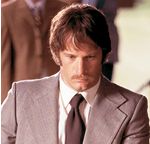 Stander
Stander
Directed by Bronwen Hughes
Starring Thomas Jane, Ashley Taylor, David O'Hara, Dexter Fletcher
Running Time: 111 minutes
It is quite an accomplishment when a film can rouse our innermost rebellious desires, grab hold of our emotions, and convince us to advocate something we know is morally wrong. It can be an absolute joy to root for the bad guy, especially when he or she carries a bold charm, or perpetuates crimes based on some misguided, but noble, ideology.
Such is the case with Stander, as it was with Bonnie & Clyde and Butch Cassidy & the Sundance Kid.
In 1972, Andre Stander is a detective with the South African police force. His ideals and his loyalties are shaken up after he participates in a police riot act, where several natives are indiscriminately killed, one by his own hand. He realizes a crucial flaw in South African police work, that most of the attention is given to the dark-skinned natives, and very little to the white man. He realizes that a white man could literally get away with anything under the system, so he takes it upon himself to do just that. He robs banks. Lots of them. He does it with precision and skill, keeps the police confused, and mostly gets away with it.
Thomas Jane is terrific as Stander. He brings an egotistical charisma, an unrelenting confidence, and an aggressive attitude that makes Stander an exciting, yet unpredictable villain. How can we not love a villain who robs a bank, then has the gusto to show up at the same bank as investigating officer? Jane shines in these entertaining scenes, and even when the bank robberies become too frequent and almost blur together, his sense of daring along with the colorful costumes makes each one enjoyable to watch. He keeps the audience wondering, what will he come up with next, and what will he wear?
Stander features a phenomenal opening shot. It is a simple overhead, flying landscape shot, beginning with the expensive downtown buildings in the financial district, then flying over the residential areas, contrasting the poor living conditions of the natives. Very few shots are this effective in establishing any film's theme, and even fewer are used during the opening credit sequence. It communicates the political, as well as the socio-economical nature of the city visually, and plants the seed for the dichotomy that will become so central to the theme of rebellion later.
Bronwen sets up the political division beautifully with a pivotal scene that I consider one of the best of the year. The scene is of a large group of oppressed South Africans, marching on the police in protest. The choreography of the marchers was excellent, and apparently shot in just a single take. An impressive feat to keep so many elements going at once. The police maintain their presence, and wait for things to get out of hand. An overhead shot from within a helicopter shows a sniper ready, prepared to fire on the crowd. The tension unravels naturally, as the audience knows something is to happen, the question is when. When it finally does happen, the audience can't help but be emotionally involved. It is a spectacular scene that brings in the political element, plus also shows the breaking point within Andre Stander. It works on so many levels.
The movie makes Stander's motivations seem politically motivated and rebellious in nature. In reality, his intentions probably weren't so altruistic. Stander was most likely an opportunist rather than some 20th century Robin Hood. Still, we can easily forgive a little cinematic license, because putting the audience in the midst of the politics of the era does almost recreate the rebellious nature of the 60s, the sort that made Bonnie & Clyde and Butch Cassidy &the Sundance Kid such eloquent social commentaries. While Stander may not carry the same timeliness as those, the effect is the same. We know and can relate to the politics of apartheid, and Stander is a terrific outlet for those feelings.
Score: 8/10